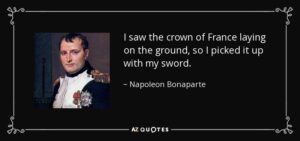Or more accurately, what is a human?
by John Heers, First Things Foundation
What is a human right? To answer this question I propose that we investigate first things first. What is a human?
From the Isle of Mann in the sea between England and Ireland, sometime around the 7th Century AD, we find this story: Human beings are the survivors of the events of Ragnarök, a great war between the gods of the Norse. The two survivors, Lif and Lifthrasir, man and woman, gave birth to humans and it is the goal of these humans to appease and stay in alignment with the victorious gods of the Ragnarök.
From Nicea, a town in modern-day Turkey, in the year 323 AD, we see this: A human being is by grace, what Christ is by nature. God became man so man can become like God.
This is the fifth article in a Substack series, republished on Gab News.
From Northern India about 900 BC, historical documents and oral tradition tell us this: Human beings are consciousness, or atman, or soul. This atman is the inner life while Brahma is the outer reality, the Creator bursting forth in the form of creation. The goal of a human being is to unite the atman with Brahma, the inner to the outer.
From the Arabian Peninsula in the 700s AD: Human beings are uniquely endowed creatures, beings with the spirit of God indwelling, rational creations able to perfect themselves because they have rational divine qualities.
From the Chinese mainland around 550 BC: Humans are the children of the Dao. To live fully, people must mediate between Heaven and Earth. The goal of a human being is to radiate purity, innocence, and simplicity, which is of the Dao.
And here’s one more, from about 350 years ago. From John Locke, a political philosopher and a very, very Light Person (see my first post for more on what a Light Person is). Locke says a human being is by nature free, and not subject to a king. Human beings are rational creatures with natural rights, such as the right to life, liberty, and property. These rights are not bound by time and tradition, they are universal, and not subject to variations in culture. The point of life is the application of reason so human beings can flourish. Rights are inalienable and from the Creator, and humans should honor this.
And now, here’s one from an hour ago, from biologyonline.com. This one is fun:
Humans are bipedal hominids with a higher and more vertical forehead than earlier hominids. The brain volume of a human is about 1,400 cubic centimeters. Human teeth and the human jaw are smaller than earlier non-human hominids and the chin is prominent. Humans are capable of creating and using complex tools, solving problems by sense and reasoning.
There are so many definitions of a human, but in many ways there are only two; pre-Enlightenment and post. In the old human anthropologies, we see that human beings are always juxtaposed to a bigger, more divine, more perfect being than themselves. All Old World anthropologies put the human being in some sort of relationship with his or her maker.
Today, in the Light People cult of modernity, this is no longer the case. The Light People deists pushed God further and further away until a human being became a bipedal hominid with a high forehead that came from a big, pointless bang. Today we see that human beings have no nature other than the nature which they assign to themselves. This might be a good thing if you believe yourself a god. And even if you don’t use that language, modern human anthropology unknowingly asserts that we are our own. Modernity teaches us that we are our own gods.
Human beings are God, or so it seems in the New World.
Let’s keep going though. That seems dramatic. Let’s go back to the rights question. Which universal rights should a so-called universal human get?
Using the Light People definition, a human right could be one that protects a hominid from other hominids. You find that in lots of Light People philosophies. Protection here seems important, but how should advanced hominids understand protection? Is this what the Founding Fathers were calling security, and is it akin to the pursuit of happiness? Which rights must a hominid regard as most likely to create happiness? The right to surf the internet on a rainy Sunday, perhaps?
If we use the Hindu notion, maybe a human right is the right to grow your soul, atman. Could that be what a right is? If so, can I call the cops when my neighbor is interrupting my mantra honoring the atman? Shouldn’t my neighbor calm down if I am supposed to be a good soul? Should we arrange rights to help us arrange peace for our atman?
Should rights go hand in hand with purpose? If the purpose of a human is to appease the Norse gods, then it seems like there should be a right to sacrifice, right? But would that only be for Norsemen? What about the people being sacrificed? Do they get a right? The right to life? Do animals get that right? (Bye-bye pork tenderloin Sundays). If you go with the old Christian idea of theanthropology it seems like we’d all have the right to ask for forgiveness. Wait, would Old World Christians even have rights at all? (Spoiler alert: no).
How do we get rights? Do we inherit rights from our parents or from our gods? Or maybe we get our rights from our textbooks? And shouldn’t this all be a bit more obvious if we all have them — these rights? All of us understand what a chair is because we all have butts. Shouldn’t knowing what a human right is, be much easier?
Gosh, this is messy.
So, let’s try and make it just a little less messy. Here’s a list of rights that come from the United Nations and their Universal Declaration of Human Rights, written after World War II, and enshrined on December 10th, 1948. There are thirty rights in total but let’s just try the first ten.
- All human beings are born free and equal with rights. Everyone is endowed with reason and conscience and should act towards one another in a spirit of brotherhood.
- Everyone has the right to life, liberty, and security of person.
- No one shall be held in slavery or servitude.
- No one shall be subjected to torture or to cruel or inhumane treatment.
- Everyone is recognized equally before the law.
- Everyone has the right to own property. No one shall be arbitrarily deprived of his property.
- Everyone has the right to freedom of thought, conscience, and religion.
- Everyone has the right to freedom of opinion and expression.
- Everyone has the right to work.
- Everyone has the right to rest and leisure.
There you have the first ten universal human rights according to the United Nations. Go and read the other twenty some time, it’s interesting. Just using these ten, however, what do you notice?
I hear in the words above as the sounds of the American Revolution. I notice The Bill of Rights.
I notice the presence of another document too, one produced the same year as the American Bill of Rights, this one from the French Revolution and entitled The Declaration of the Rights of Man and Citizen. Here are the first four rights in that French constitution:
- Men are born and remain free and equal in rights.
- The goal of the state is to conserve the natural and imprescriptible rights of man. These rights are liberty, property, safety, and resistance against oppression.
- The principle of freedom resides in the people of the nation, not in the leaders of the nation.
- Liberty consists of doing anything which does not harm others.
The French and the American experience share lots of things, including this search for human rights. That makes sense. But check out this document, from Russia, in 1936, a document known to Russians as Stalin’s Constitution.
- ARTICLE 123. All citizens enjoy the right of equality before the law irrespective of race or nationality.
- ARTICLE 125. Citizens of the U.S.S.R. are guaranteed
- a. freedom of speech;
- b. freedom of the press;
- c. freedom of assembly, including the holding of mass meetings;
- d. freedom of street processions and demonstrations.
- ARTICLE 119. Citizens of the U.S.S.R. have the right to rest and leisure.
- ARTICLE 121. Citizens of the U.S.S.R. have the right to education.
Stalin’s constitution assures that people have the right to freedom of speech and freedom to demonstrate against their own government. Full stop. Joseph Stalin, the best of all mass murderers, was a purveyor of human rights. Who knew? Joe Stalin was enlightened!

What is going on here?
What’s going on is an attempt to create a sacred set of secular principles. What you see in these documents is a type of New World religious text, a sacred canon of deistic and atheistic principles. What we see is a way to make human beings aware of their equality and of their unique human qualities. What we see is also the application of these sacred secular principles to the universe, to all of creation. We see the emergence of an atheistic holy writ.
This writ, because it is said to be universal, supposedly covers all the ways of doing rights. It is for the universe, the whole darn universe! This Light People universal rights experiment is not connected to the divine, however. There are deistic references to “a creator” and “wisdom,” but for the most part, this Light People holy writ thing is us doing us. It’s the tip of the evolutionary spear, the latest iteration of evolved humankind creating the latest version of holy things, and all of it without transcendence.
If you think about it, the left-braining Light People have programmed a looping ontology. It goes like this: “Rights are important because people are important. And people are important because they have rights, and rights are important because…” And so on, and so on.
Light People have a meaning problem on their hands. They don’t know how to end the loop without crashing the system.
What we are witnessing in these universal rights documents is Light People disengaging from the divine. What we are seeing is the movement from a messy Old World where we were anything but our own, to a world where we are utterly our own. These documents demonstrate how the words, “a bipedal hominid with about 1400 cubic centimeters of brain space” can be an actual straight-faced answer to the mystical question, “What is a human?”
It’s sad. I know.
These Light People documents are great at defining rights, but they do nothing to say why humans have them. This iteration of “rights” seems more like a bookmark, a temporary canon waiting for the next turn of evolution. Are these rights in alignment with eternal reality? Do they change with the seasons? Are they really universal in the sense that they are real? Relevant? You know, human?
I don’t think so. I don’t think anyone thinks so. Most of us know that these rights are just Light People creating a utilitarian solution to the vexing ontological questions that have faced us divine bipeds since the mists of divine time. I fear that Light People’s constitutions are frenzied efforts to maintain order in a meaningless, desacralized world.
It won’t work.
This article originally published on Substack on July 17, 2023.








